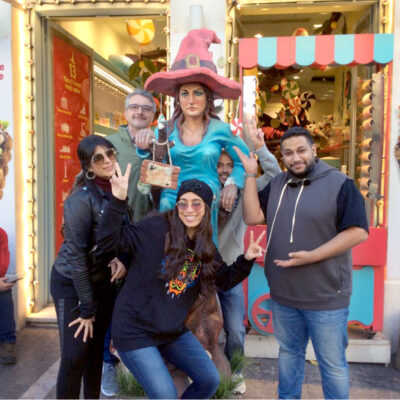Storytelling at work plays an important role in all of our lives, whether we realize it or not. When people think of storytelling, things like books, movies, video games, and TV shows may come to mind. But storytelling goes beyond entertainment; it is also something found in the workplace.
Stories can be a powerful tool. They can teach us lessons, get us motivated, help us connect with others, and much more. A good story can unite everyone around a goal, get them engaged, and leave them feeling inspired. Leaders who understand the importance of stories can use them to transform their team and get results.
On this episode of the Team Building Saves the World Podcast, we talked to Karen Eber—CEO and Chief Storyteller of Eber Leadership Group. She highlighted that storytelling is a powerful that can be used in all sorts of situations and scenarios, saying:
“Storytelling is not limited to sales or nonprofits or giving a speech. You can use the same approach if you’re giving a toast at a wedding or if you’re preparing for a job interview… You can use a story that is going to connect with them in a different way and move them to a different place.”
In today’s blog, we’re going to take a look at the power of storytelling at work, its importance, how it can improve your team, and how you can become a more effective storyteller at work.
The Power of Storytelling at Work
First, let’s focus on the power of effective storytelling at work. Storytelling can be an incredible tool to have, and it can help you and your business in numerous ways. It can be used to teach a lesson, get across a message, bring people together, and so much more.
One of the most unique things about storytelling is its ability to convey complex emotions, feelings, and thoughts. Oftentimes, those complex ideas can get in the way of effective communication, but you need to be able to convey those ideas to your employees.
That’s where storytelling comes in. You can convey something incredibly complex in a much simpler and more relatable way. A story can make it easy for others to understand those feelings, and it can give you a way to convey those feelings to others.
Stories can also be a more relatable way of communicating. Serious work-talk can get tiring over time, and sometimes a story provides a more fun and enjoyable way to communicate. They can help you build better relationships with employees, which translates into better teamwork and productivity.
All that said, storytelling is only effective if you know how to do it. It’s not as easy as it might seem, and there are a lot of things you have to be mindful of when telling a story. Things like the characters, conflict resolution, and more play a big role in how effective your story is.
Elements of Effective Workplace Storytelling
Now, it’s time to focus on the elements of effective workplace storytelling. As mentioned above, the stories you tell need to be effective. And to have an effective story, there are a lot of elements you need to have.
One of the first things you should do is identify the main message or lesson. You are telling a story for a reason, so what is that reason? Do you want to motivate? Inspire? Maybe you want to show your employees that mistakes aren’t the end of the world. Whatever it is, you want to have a main message or lesson.
Adding on that, that message needs to be easily identified by your audience. You don’t want your story to end with people asking, “So what was that about?” The message you’re trying to convey should be clear to your audience. That leads to the next point, which is about the audience.
You also need to identify your audience and craft your story to them. Your story needs to be tailored to your audience. It’s easy to focus on the story itself, but the story is nothing without its audience. This is something that Eber mentioned during our discussion.
“Storytelling starts with your audience and not with the story… It has to be in service of the audience and what you’re trying to do,” she said. “Otherwise, you’re that uncle at the holiday table that’s telling the same story again and everyone around the table is mouthing the words because they’ve all heard it before.”
Besides that though, your story also needs the basic elements of the story. A good story needs conflict, resolution, relatable characters, facts, and emotions. You need to incorporate and balance all of those elements for an effective story. With all of those elements together, you can tell stories that will be memorable and impactful.
Applications of Storytelling in Different Work Scenarios
With the basics of storytelling covered, now it’s time to think about how you can apply storytelling in different work scenarios. There are a lot of different situations where stories can be useful, and many of them might be a surprise. So let’s go over different ways you can utilize storytelling at work.
One of the more obvious ways to use stories is in presentations and pitches. A good story can make a pitch stronger, make a presentation more memorable, and ultimately make it more powerful and effective.
A story can add an emotional element that you just can’t get with data and facts. And since humans don’t make decisions and judgments based solely on facts, stories can be a powerful tool for your presentations and pitches.
Another common use is in leadership. Storytelling can be used to motivate teams to increase work performance, convey a vision, share a personal message, and much more. A good leader can tell stories that motivate, inspire, and comfort their employees. Don’t underestimate the impact of a good story told by a leader.
One last application for storytelling is team building. Having a cohesive team that can work together and communicate effectively is essential. Storytelling can be a tool that helps you build those connections and develop relationships that result in a stronger team.
For example, our Team PechaKucha event is a storytelling workshop that focuses on team building. You’ll get to improve upon your storytelling skills while building valuable connections with your team members. Storytelling is one of the best ways to team build, and you’ll get a skill useful for other applications.
Developing Your Storytelling Skills
So, how can you develop your storytelling skills? Storytelling can be an intangible skill, meaning it’s not something you can easily measure. What can you do to improve your storytelling at work so it’s more effective?
Let’s start with an obvious one—practice. Practice makes perfect, and storytelling is no exception. The more you tell stories and become comfortable doing it, the better you’ll get at it. Whether that’s through workshops, exercises, or real-world experiences, practicing is essential.
Another way to improve your storytelling is by learning from other storytellers. There are lots of incredible storytellers out there, and there’s a lot you can learn from them. Read and listen to stories from great storytellers and take note of how they do things.
The next one is something that lots of storytellers overlook, but it can have a huge impact on your storytelling ability—listening. Good storytellers are good listeners. They learn about the world and people around them, and those details can become valuable when telling a story.
Eber mentioned this in our podcast, and she made a point to emphasize that being a good listener is key to being a good storyteller.
“Introverts in particular have what I call ‘the quiet advantage’ because you as an introvert are often noticing some things that other people don’t,” Eber stated. “That makes you able to point out different connections and put a spotlight on different things or celebrate different people. And so immediately, you are going to have this perspective and ideas that others don’t have.”
Even though storytelling is all about talking, listening is just as important. Make an effort to be an active listener. Carefully consider what those around you are saying, and don’t just wait for an opportunity to talk. Being a good listener will pay dividends on your storytelling skills.
How Storytelling Can Connect Your Team
Before wrapping up, let’s quickly look at how storytelling skills at work can connect your team. Storytelling can connect your team in all sorts of ways, and being aware of that can help you use your storytelling in more effective ways.
One of the most direct ways storytelling can connect your team is by creating friendships and connections. Stories have brought people together for thousands of years, and they can bring people together in your office too. Gathering around to share a story can help grow friendships and connections.
Stories can also create a sense of belonging and community, which is very important to employee wellbeing. Employees want to feel like they are part of something bigger, and storytelling can help make that happen.
They can also be effective when it comes to breaking down barriers and dealing with conflicts. Stories can provide valuable insights, context, and lessons that make communication easier and allow you to solve problems.
Transform Your Team with Team Bonding
Storytelling is something that exists all around us, but many overlook the role it plays at work. Stories can help you bring people together, build relationships, connect your team, inspire, and so much more.
Transform for your team today with Team Bonding. We have over 25 years of experience in corporate events, and we are here to help with employee engagement and satisfaction. And with a huge selection of events, there’s bound to be something for you. So get in touch with us today!
















